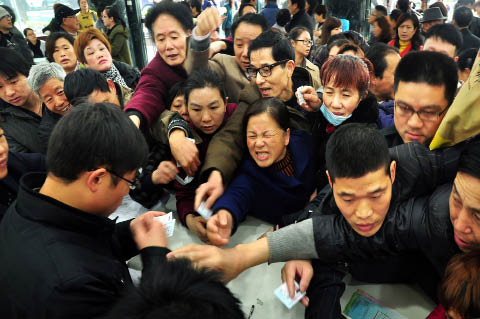Crazy for Real Estate
By WILLIAM HILTON
 |
| Many cities saw a rush to sell houses after the central government announced a 20 percent tax on sellers' profits on second homes would be imposed in a bid to curb speculation. |
TRENDS in the real estate markets in cities across China have defied new control measures. Transaction volumes have spiked, and prices are heading up rather than stabilizing as intended. The domestic media has given wide coverage to home buyers queuing literally for at local authorities offices to get official stamps on their documents and pay relevant taxes before the newest measures take effect at the end of March.
All of this begs the question, are these kinds of “control” policies working? Furthermore, are they targeting the right phenomenon?
The State Council has been passing incremental measures to control urban real estate prices for almost a decade. Most recently the government called for stricter application of a 20 percent capital gains tax, as well as further strengthening down payment requirements and restrictions on purchases of second homes. In the weeks that have followed the domestic media has been full of reports of a mad rush by both buyers and sellers to make deals ahead of this latest set of controls targeted at urban property prices.
To find answers to these questions, many have turned to commentary from the people they most expect to have good explanations for what seems to many outside observers as irrational behavior – economists. I regret to inform you, however, that conventional economics has little to contribute to a real understanding of what is happening in major urban property markets in China. Housing prices are just too high relative to incomes.
More informative is a systems perspective that better accounts for the relationships between major social and economic factors and how they are driving prices than simple notions of supply and demand. With this in mind this article will look at the interaction of three such factors: cultural values, power and wealth.
One critical aspect of China’s real estate boom is the role of culture. In general, we can say that culture is to a social system what DNA is to a biological one. When it comes to real estate, the security of home ownership is part of an image or blueprint of the present and future that has resulted in strong demand for urban housing in the face of high prices and successive rounds of policy control measures. Additionally, a preference for saving over consumption is deeply ingrained.
Some researchers have gone so far as to propose that a major driver of housing demand results from what they call the “mother-in-law phenomenon”: pressure from future in-laws and cultural norms that has made owning urban real estate almost a prerequisite for discussions about marriage. Be this as it may, the cultural importance of urban home ownership in a country still transitioning from the countryside into the city has proven nearly impossible to contain.
For many households worldwide, real estate serves as an important store of wealth. It is a classic hedge against inflation and has provided better long-term returns than other forms of investment in many developed economies. It is thus no surprise that many historic sites across the country tell a story of successful families investing their growing wealth by building extensions to their courtyards or undertaking renovations to existing ones. Related potential tourist destinations are numerous along the great trading routes of the past, including those along the Silk Road and major inland waterways. Enduring wealth is a function of real assets.
Another important part of the real estate story in China, also one where economics has little to contribute, is about power. This topic is often related to control over the supply of land in China, and the reliance of local governments on property-related taxes to close fiscal funding gaps. These phenomena are important parts of the story, but perhaps more important is what central authorities are or are not doing in other areas, the results of which serve to divert demand to property investment.
Households in China save a large proportion of their incomes, creating a very large pool of investable assets, most of which are parked in bank deposits with an interest rate not much higher – and sometimes even lower – than the rate of inflation. Real estate has consistently provided a good alternative, not for rental income, but as a means of preserving the purchasing power of their funds against inflation.

